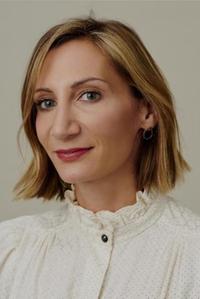 |
|
| (photo: Nyra Lang) | |
Emma Rosenblum is chief content officer at BDG (Bustle Digital Group), overseeing content and strategy for the lifestyle, parenting and culture & innovation portfolios. Prior to BDG, Rosenblum served as executive editor of Elle magazine. She joined Elle from Bloomberg, where she was the editorial director of Bloomberg Pursuits, having served as a senior editor at Bloomberg Businessweek and a senior editor at Glamour. She spent her childhood years summering at her family's vacation home on Fire Island, the setting for her debut novel about wealthy people behaving badly and a mysterious death, Bad Summer People (Flatiron Books, May 23, 2023).
Where did the idea for Bad Summer People originate?
Over the years, I'd considered writing a book, but didn't think I'd have time for a nonfiction project. I'd grown up going to Fire Island during the summers, and was back as an adult with children in 2021. While there, it occurred to me that it would be the perfect place to set a novel. It's so beautiful and insular--you have to take a ferry to get there! So I decided to give fiction a go, and started with the idea of a death that happens at the end of the summer. Then I went from there.
You do a marvelous job of describing the different perspectives of those characters who grew up summering on an island and those who didn't. As someone who is an insider when it comes to the summer island community, how did you develop the outsider lens of characters like Lauren and Robert?
As a journalist, I've learned how to observe as an outsider, regardless of circumstances. I also had fun watching my husband, who's British, experience Fire Island for the first time. It reminded me of how singular a place it really is.
Is there a character in the book whose creation you enjoyed the most?
They were all fun to write, but I probably enjoyed Rachel Woolf the most. She's so specifically sad. Through no fault of her own, she's not lived up to the arbitrary goalposts that women are supposed to meet by a certain age (marriage, kids, money) and that eats away at her to disastrous consequences.
In your opinion, who is the most redeemable of your characters?
Ha! Without giving anything away, Micah is the best of the bunch. He's young enough to not have been corrupted (yet). Though, of course, as in life, none of the characters think they're bad people.
Bad Summer People offers thoughtful commentary on the corrupting influence of money and the ways in which the moneyed can be blind to the plight of those with far less. If the success of your novel catapults you to millionaire status, what are some of the ways in which your approach to life will differ from that of Lauren, Jason and others?
This would be a good problem to have! I hope that many people enjoy reading the book, and that it finds success. I also don't think any amount of money could turn me into one of the characters in Bad Summer People.... They're on an entirely different planet.
Tennis is the medium through which Rachel competes with other women on the island. What is it about the game that makes perfectly average players so competitive with each other?
The most amazing thing about tennis is that you can play it your entire life. And unlike, say, golf, tennis is a game in which you're actively trying to beat your opponent. So you have grownups tapping into that playground mentality of winning, mano a mano, in a way that they don't get to in their normal, adult-y lives. And that makes some people, er, go overboard.
Did your journalism skills and training supply built-in tools that proved helpful in writing a novel?
Yes! Firstly, as someone who has written and edited profiles, I knew how to identify those small, illuminating details that could quickly convey a person's worldview. In a novel that switches perspective, that was useful. I'd also learned a lot about story structure, about beginnings and middles and ends, and pacing, all of which I incorporated into my first draft. And finally, I've worked with many brilliant, merciless editors throughout my career, and had been trained to preemptively cut anything that was boring or extraneous or, God forbid, flowery. That impulse kept Bad Summer People tight!
How did you find the time to craft your novel while juggling the demands of a career and family? What is your advice for aspiring writers who can't find the time to write?
I tried to write in the mornings for an hour or so, after my kids were off to school and before my work calls started, around 10 a.m. Then I'd bring up the draft in between Zooms, or on the weekends, when my boys were playing (my husband was very helpful in this regard). I don't need silence to focus. I'm also lucky in that I'm a fast, decisive writer. I make choices, go with them, and engineer them into the other side.
My advice for time-strapped writers is to set reasonable goals and think of them as part of your job. I tried to finish 5,000 words a week, and held myself to that. Get good at meeting self-imposed deadlines. Imagine there's an editor out there, breathing down your neck for your finished draft.
Can readers expect a juicy sequel to Bad Summer People?
I think I'm done with Salcombe for the time being! But I invite everyone to imagine what happens next. And I will have another book out in the near future, so please be on the lookout. --Shahina Piyarali

